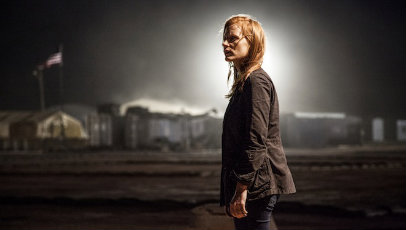Three years after reigning supreme at the Academy Awards with The Hurt Locker, director Kathryn Bigelow and regular collaborator Mark Boal return with Zero Dark Thirty. CIA analyst Maya (Jessica Chastain) has spent years chasing falsified intelligence relating to the possible whereabouts of terrorist Osama bin Laden. Undeterred, even in light of her colleagues’ ever-weakening investment, Maya makes a breakthrough when his possible hideout is revealed, leading to a night-time raid by a U.S. Navy SEAL team unlike any other.
More concerned with illustrating the ins and outs of Maya’s almost singular exertion (to her, long stretches of coming up short are the norm, resulting a measured mood that permeates the entire film), Zero Dark Thirty takes on a temporal and procedural attitude as board meetings, political vernacular and the inner workings of Maya’s merciless and fractured mind – accentuated by Alexandre Desplat’s percolating score – become screenwriter Boal’s chief focus. Other characters converge in the background, but Maya remains at its core.
This approach, as well as the fact Maya’s backstory is never alluded to let alone exposed (Chastain, though, rises to the challenge of working with very little material to deliver a blistering performance), results in a film that’s often difficult to engage and emote with. Thankfully, the way in which the narrative constantly amplifies the intensity and severity of the operation through Maya’s assurance and drive and Bigelow’s pinpointed direction ensure Zero Dark Thirty is kept as sharp as possible.
It’s a triumph in itself considering the bloated running time (a decades-long operation has been condensed into 160 minutes). Even more of an achievement is how tense the film is from start to finish, despite the fact that everyone knows how the story ends. Bigelow and Boal have somehow managed to carve a suspenseful procedural that culminates in a sensational final act – one that’s expertly captured on several cleverly instrumented handheld cameras.
Whether there’s any real need for Zero Dark Thirty is up for debate, but there’s no doubt that the film makes for fascinating, powerful and electrifying viewing. Nothing is watered down or sensationalised to appeal to a mass audience. Rather, Zero Dark Thirty demands your constant, unfaltering concentration from the off, and rewards you exponentially come its final moments as we watch in breathless disbelief as the horrifying relief spreads across Maya’s exhausted face.

It’s a strangely passionless film, isn’t it? But so well put together. You’re right, Chastain does a lot with very little. Good take on the film man.
LikeLike
Agree with everything you said. My problem was that as time went by, I liked the film less and less in retrospect. VERY well put together, does a great job of conveying the tension of the CIA officers involved, but the flip side of the that seems to be: Well, of course they’re callous; of course they torture–you’d be callous and torture too if you were in their circumstances too. I’m not unsympathetic to that point of view. However, as has been repeatedly pointed out, intelligence on OBL’s whereabouts did not come about through torture. And of course no mention was made of the Afghani cab driver–later discovered to have no terrorists connections at all–who died in American custody after repeated beatings. Good review. Ken
LikeLike
[…] 1. Quote is from Mark, a commentor from Centrefolds & Empty Screens review of Zero Dark Thirty here. […]
LikeLike
Can’t wait to see this film looks really interesting!
LikeLike